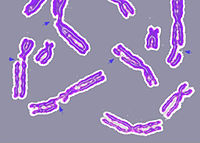
Photo from wikipedia
Acromegaly is a hormonal disorder resulting from excessive growth hormone (GH) secretion frequently produced by pituitary adenomas and consequent increase in insulin‐like growth factor 1 (IGF‐I). Elevated GH and IGF‐I… Click to show full abstract
Acromegaly is a hormonal disorder resulting from excessive growth hormone (GH) secretion frequently produced by pituitary adenomas and consequent increase in insulin‐like growth factor 1 (IGF‐I). Elevated GH and IGF‐I levels result in a wide range of somatic, cardiovascular, endocrine, metabolic and gastrointestinal morbidities. Somatostatin analogues (SSAs) form the basis of medical therapy for acromegaly and are currently used as first‐line treatment or as second‐line therapy in patients undergoing unsuccessful surgery. However, a considerable percentage of patients do not respond to SSAs treatment. Somatostatin receptors (SSTR1‐5) and dopamine receptors (DRD1‐5) subtypes play critical roles in the regulation of hormone secretion. These receptors are considered important pharmacological targets to inhibit hormone oversecretion. It has been proposed that decreased expression of SSTRs may be associated with poor response to SSAs. Here, we systematically examine SSTRs and DRDs expression in human somatotroph adenomas by quantitative PCR. We observed an association between the response to SSAs treatment and DRD4, DRD5, SSTR1 and SSTR2 expression. We also examined SSTR expression by immunohistochemistry and found that the immunohistochemical detection of SSTR2 in particular might be a good predictor of response to SSAs.
Journal Title: Journal of Cellular and Molecular Medicine
Year Published: 2018
Link to full text (if available)
Share on Social Media: Sign Up to like & get
recommendations!